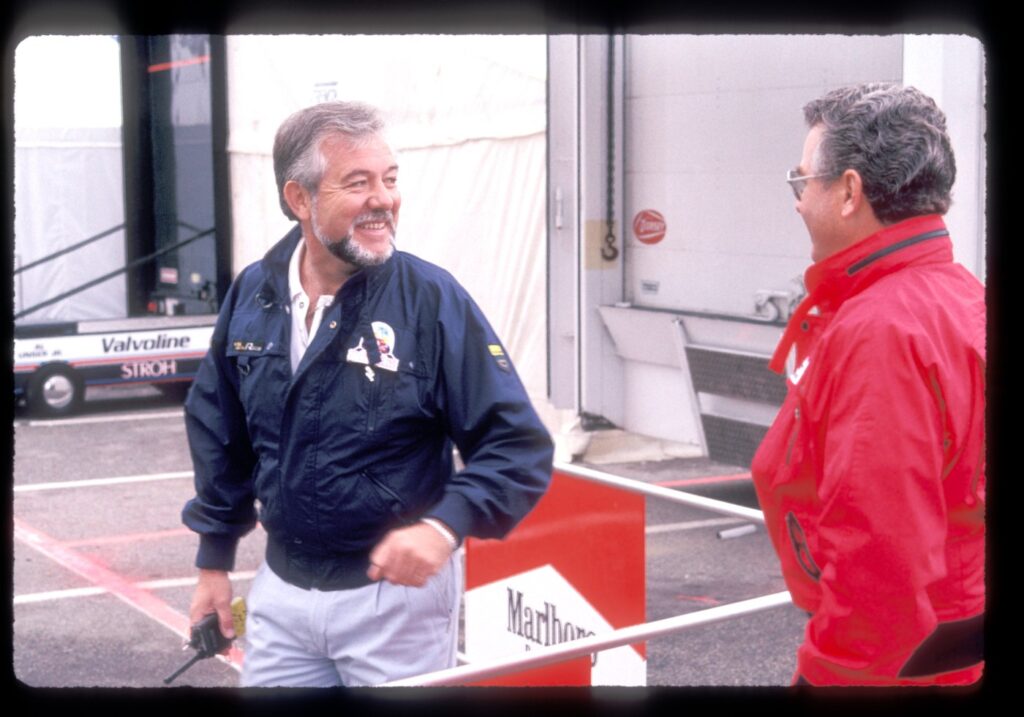
On Memorial Day 1973, Chris Pook, then a young travel agent in Long Beach, was watching a street race in Monaco on television — when, he said, “an entrepreneurial light bulb went off.”
Monaco had used a street race to establish an identity and compete with the French cities of Nice and Cannes.
“I thought to myself,” Pook said last week, “‘If Monaco can do it, why can’t Long Beach?”
It turned out to be easier said than done. But Pook, at 34, overcame dozens of obstacles and objections, including cries of “crazy idea” and “never will happen,” to establish the first Grand Prix of Long Beach in 1975. From that first race, the Grand Prix grew and grew. Today, it is considered the premier street race in the country, beloved by drivers and fans alike, and the three-day weekend is Long Beach’s biggest annual party — with major economic benefits.
This year, the Acura Grand Prix of Long Beach, scheduled for April 13 to 15, will celebrate its 50th anniversary.
And for his decades of work in the motorsports industry, Pook will be doubly honored at the Motorsports Hall of Fame of America’s 37th induction ceremony in Daytona Beach, Florida, on March 10 and 11.
Pook, who is “largely regarded as the father of modern-day street course road racing in North America,” according to Motorsports, will receive the prestigious Bob Russo Lifetime Achievement Heritage award and will serve as the honorary chair of the ceremony, presented by Toyota Racing, which will honor the Hall of Fame class of 2025 racing driver inductees.
“I feel very humbled by this,” Pook, 83, said from his home in Long Beach. “This honor is more than just for me. It’s for the city of Long Beach, its staff and everyone on the Long Beach Grand Prix staff, past and present, who have taken the event to where it is today.”
The Long Beach race, Pook said, would not have occurred without the help and support of many other people, particularly the late racing great Dan Gurney, “who embraced and supported the concept from the very start.”
Pook remembered when his idea for a Long Beach race got off to its real start in June 1973 at a lunch in Lombardo’s restaurant (now the 555), which was in the Fidelity Savings and Loan Building at Ocean Boulevard and Linden Avenue.
“We put the idea down on a napkin at Lombardo’s,” Pook said, “and it took off from there.”
Unfortunately, no one thought to save the napkin.
Mario Andretti, who is in the racing Hall of Fame, is among the drivers who loved competing in Long Beach. He won the Grand Prix of Long Beach four times and was once known as the “King of the Beach” — until another racing legend, six-time GPLB winner Al Unser Jr., took that title from him.
“(Pook was) an ultimate racing visionary who created something for the ages in Long Beach and deserves all the credit in the world,” Andretti said. “It was his vision and hard work that made it happen.”
In a foreword to a book on the history of the Grand Prix of Long Beach by Gordon Kirby, Andretti wrote that Pook was trying to do something that had never occurred before in modern times in America.
“From my standpoint, I was delighted to hear about Chris’ plans, but I have to admit, I said, ‘What the hell is he drinking?’” Andretti wrote. “Putting on a street race in a city in Southern California was going to be a tall order, but then I discovered he had people like Dan Gurney on his side. Dan was a huge help to Chris in making it all happen, and I was delighted to take part in the first Long Beach Grand Prix.”
Andretti and Unser Jr. will be co-grand marshals for the 50th anniversary race in April.
“Pook’s ‘crazy idea’ to go racing in the streets has become a model copied across North America for bringing racing to the people and using it to rebuild flagging urban communities,” Motorsports said in a recent statement announcing Pook would receive the lifetime achievement award. “The now-Acura Grand Prix of Long Beach stands as IndyCar’s second biggest event outside of the Indianapolis 500 and is recognized throughout the world.”
The Motorsports Hall of Fame of America is the only hall that honors all U.S. motorsports: cars, motorcycles, airplanes, off road and powerboats. It held its first induction in 1939 and was originally in Novi, Michigan, before moving to Daytona Beach in 2016.
Among recent motorsports powerbrokers awarded the Bob Russo Lifetime Heritage honor are Johnny Morris, founder and CEO of Bass Pro Shops; Lynsi Snyder-Ellingson, owner and president of In-N-Out Burger, for her efforts to preserve the future of drag racing in the U.S.; and Edsel B. Ford II, considered the “godfather” of Ford Motor Company’s racing efforts and a prominent ambassador for auto racing globally.
Besides Pook’s entry into the Motorsports Hall of Fame, as just the 17th Heritage Award recipient in the Hall’s nearly 40-year history, the complete Class of 2025 includes Skip Barber (sports cars), Miguel Duhamel (motorcycles), Carl Haas (open wheel), Ed Iskenderian (at large), Dale Jarrett (stock cars), Tony Schumacher (drag racing), Bill Stroppe (off road), Louie Unser (historic) and William K. Vanderbilt (historic).
For Pook, the honor culminates decades of dedication to motorsports — that all began with the Grand Prix of Long Beach.
“We went through a lot of trials and tribulations getting the first race started,” Pook said, “but it was all worth it in the end.”
